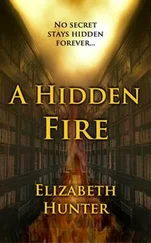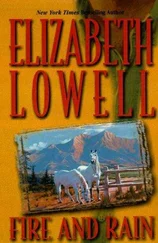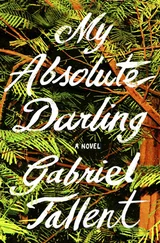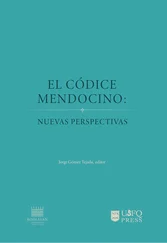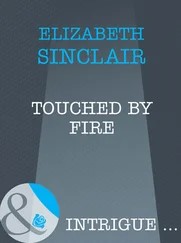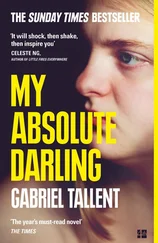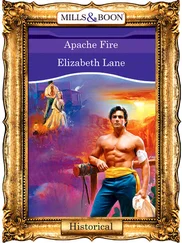Elizabeth Tallent
Mendocino Fire
Among the son’s bright fucking ideas , that last summer they worked together, was the notion that since there was good money in sportfishing they ought to start taking out parties of tourists. Shug could savor a rank cigar, resting up his bad shoulder while doctors and lawyers baited hooks, and when a senator failed to reel in a big Chinook Shug could grin around the last skunky inch and salt the wound with “Wave bye-bye to your wallhanger, son.” Nate figured guys like that would secretly dig the condescension and come back for more, because no matter what he said or how he treated people Shug was indulged, a dispensation Nate had not inherited. He did get his share of the Dawe looks — lank black hair that came to a widow’s peak in front, large homely ears, definite jaw — but the mix could go different ways, in Nate a semicomic near miss, in his father strong-boned, remorseless beauty that misleadingly suggested great depth of character. Women, sure — the beauty of women was supposed to cause trouble, but Nate would not have believed such havoc could be wreaked by a man if he hadn’t witnessed the consequences firsthand. He was sometimes asked by unsmiling women how his dad was doing these days and had figured out that the right, if fallacious, answer was “Not so good.” Once as a kid Nate was given a packet of red licorice by a high-heeled out-of-town-looking woman who said earnestly, “I know he’s your father but he’s a liar.” And then: “You know better than to tell your mom where you got that, right? Yeah, I can see you do.”
Fishing guide was a comedown, and Shug surely viewed it as such, but Nate’s plan held out the promise of redeeming pleasures. The same stories that caused Nate to grind his teeth lightly together — the freighter lit up like a nighttime skyscraper bearing down on Shug through fog, the mast clustered with barnacles that flaked upward as a whirlwind of monarch butterflies, the shark in whose sliced-open belly Shug found a seagull — would be taken for gospel by tourists eager to experience the real Mendocino. If there were wives along, Shug could charm them — saying this, Nate suffered a familiar pang. Shug did more than charm. He would grin back at the big black sunglasses hiding the wives’ curiosity, and at some point he and one of the wives would rendezvous in a fifty-dollar room with a factory seascape over the creaky bed, but Nate could handle this if it meant saving the boat, and whether Shug acknowledged it or not they were in dire straits along with every other fisherman they knew, government regulations hemming them in on every side. This last was a good point to make to Shug, who hated the federal government worse than Vietnamese abalone poachers, worse even than bankers. Reborn as a party boat, the Louise would be consistently booked, and they could rely, day by day, on the money coming in, a certainty no Dawe had ever before possessed, and worth a try, Dad, right?
“Over my dead body.”
Which phrase caused Nate to tread guiltily, eyes averted, past that dead body cast up on the pebbled beach of consciousness.
Like most who count on intuition Shug had his ritual, resting scarred knuckles against the bone over his dark eye and waiting. His green eye was ordinary, but the tortoiseshell one saw down through the world’s surfaces to its deep, shifting currents of luck, and even when other boats came home empty the Louise was nearly always in the fish. When, seven years old, Nate first said he wished he had a weird eye, the confession met with the rebuke, mild for Shug, that he was imagining things.
This was on the Louise , a diamond afternoon shattering across the ocean, waves hurrying at the pace of a fire-drawn crowd, Nate captive in childhood, in an old life jacket, arms dangling like a fat boy’s, meaning his tall graceful father was even more likely to lash out than usual because he was irked by awkwardness as a cat is by wet paws. The dirty, mildewy, sun-warmed hug of the life jacket braced Nate for confrontation. He was seven and alone. This was life then, this bravery, this scaredness, this love of the truth in your possession, the thing you had seen that set you apart and somehow was you. You and no one else. That morning when his mother had squatted to fasten the buckles of his life jacket, Nate had studied the center parting in her red hair and seen the jog the parting made to accommodate a pink mole, and this revelation, that his mother had flaws previously undisclosed to him, drove home the extent of her vulnerability, and he would have given anything to protect her from his father’s hectoring, his father saying Don’t fucking teach him that, no real fisherman wears one, fall overboard and you’re dead so you don’t fucking fall. His mother said He’s a kid, kids have accidents. As if Nate was not listening she said Say he falls. Nate tried to get in I won’t fall , but already (and it was not like her: she was not an insister) she was saying again Say he falls, Shug, tell me what would you do then , a protest, a demand, a bargain because she was letting his father take him, entrusting his life to his father and his father did not say what she wanted him to say, I would find him, of course I would find him , but then Shug never said what she wanted him to, and it was dismaying that she still nursed reckless hopes. Now, on the boat, Nate reasoned that if Shug was wrong about his own eyes, as he plainly was, he could be wrong about other things, and that in the gap between what his father insisted was true and what was true Nate’s private perceptions could take root and thrive. He stood there in his sissy life jacket confronting this prospect, with scarcely time to rejoice before the big rough hand cupped his head and his dad said All right now? Back to work , as if Nate worked as hard as he did, as if they were together all day long. As they ended up being.
Another memory, harder to account for, in which there was no life jacket: Once when he had made some mistake his dad had picked him up under the arms and swung him back and forth over the edge of the boat, out over the dazzling drop. Below the half-moons of white rubber capping his Keds an abyss reeled past, scintillae shuttling back and forth at the speed of panic. Nate hung there, legs dangling, hating with such concentration that he feared his father would sense it and, as punishment, let go. Instead his feet thumped down on the deck and Shug said There you are , as if this were a natural initiation into terror and Nate should have expected it. And as if he, the father, had performed it ably and even with a measure of affection. And Nate stood there, and among the things he felt was love, as if what had happened had been pure rescue.
Nate’s friends didn’t like when he started in on Shug, first because they believed in keeping family shit in the family, second because Shug took them out on the boat for their birthdays and asked How’s it going and if there was a problem with some girl he told them what to do with an authority Nate alone understood was totally bogus, since Shug hadn’t ever stayed around for problems but simply disappeared until the woman, whoever she was, concluded it was over. Still, when things got rough for him at home Nate’s best friend, Petey Crews, would say he wished Shug was his father. His screwed-up longing caused Nate to glance away: not his job to set anybody straight. Stoned the night of senior prom, Petey said it was mutual and Shug had told him he got the wrong son. What the fuck did that mean, the wrong son? Petey tried to wriggle out of it. Shug likes a good time, right? You gotta admit you’re not a lot of laughs. Maybe that had something to do with working for a living and maybe Petey should try it, Nate said, and then report back about the laughs. Petey said Nate, man, you’re too hard on your old man, you need to—. It could have been Nate’s look that caused him to break off, or the quicksand shame of condescension going awry, but whatever it was Petey said It’s just we’re more alike, him and me. Nate thought Both motherfuckers. If he had said that aloud the friendship would have ended then and there, and not because he had called Petey a motherfucker, but because he had called Shug one. But it was Petey who couldn’t leave it alone. You hate fishing, while me, I would fucking love it, that’s all Shug wants, a son to love what he loves, out on the ocean every single day, who gets to live like that, only you, right, the last of the last? On your own, live or die, make it or don’t make it, it’s down to you and your dad and how hard you work and whether your luck holds and, man, I would fucking love that.
Читать дальше

